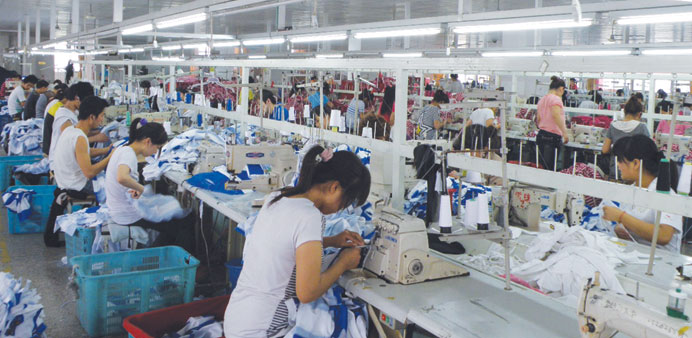China’s official manufacturing purchasing managers’ index in August is expected to fall to 51.2 from July’s 51.7, the strongest in 27 months, on weak demand.
Reuters/Beijing
Activity in China’s vast factory sector likely weakened in August as demand faltered, a Reuters poll showed yesterday, reinforcing expectations that further policy steps may be needed to keep economic growth on track.
China’s official manufacturing purchasing managers’ index (PMI) is expected to fall to 51.2 in August from July’s 51.7 – the strongest in 27 months, according to the median forecast of 13 economists in the poll.
A reading above 50 indicates an expansion in activity while one below that level points to a contraction.
The official PMI may add to increased signs of softness in the world’s second-largest economy as a slowdown in the property sector deepens, while some analysts fear banks may be increasingly reluctant to lend, particularly to private firms, as bad loans continue to rise and asset quality deteriorates.
A preliminary PMI survey released last week by HSBC and Markit showed China’s manufacturing activity slowed to a three-month low in August as output and new orders moderated.
“Problems in the real estate have started to affect some traditional manufacturing industries, such as steel, cement, home appliances,” said Kevin Lai, senior economist at Daiwa Capital Markets in Hong Kong.
A raft of stimulus steps since April, including faster spending on some infrastructure work and cuts in reserve requirements for small banks, lifted annual economic growth to 7.5% in the second quarter from an 18-month low of 7.4% for January-March.
But a sharp drop in bank lending and fiscal spending in July, alongside tepid growth in investment and factory output, suggest the economy may need fresh support to cope with a possible chilling impact from the property sector.
A slowdown in the property market appears to be deepening, hurting activity in related sectors. Some economists fear that banks may become increasingly reluctant to extend credit, particularly to private companies, as bad loans continue to rise and asset quality deteriorates.
Real estate investment, which affects more than 40 other sectors from cement to furniture, rose 13.7% in the first seven months from the same period a year ago, slowing from 14.1% in the first six months.
Premier Li Keqiang said on Wednesday that the government will maintain its “targeted” policy stance to keep economic growth on track, focusing on investment projects in bottleneck areas. The government aims for annual economic growth of 7.5% this year.
As a leading indicator that helps gauge economic momentum, the official PMI data is closely watched by the market and an improvement in the reading could bode well for other August indicators.
The official PMI figure will be released on Monday at 9 am Beijing time (0100 GMT).

